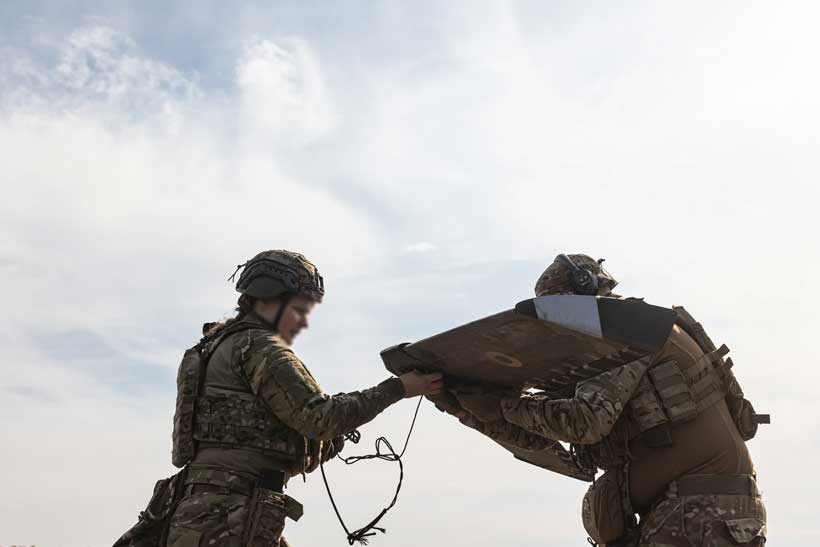Ukraine, under pressure from its ongoing war with Russia, has developed a strong domestic drone industry. The government is now seeking to turn this wartime innovation into an export strategy, both to support its defense needs and to enter global arms markets.
President Volodymyr Zelensky recently shared a vision that’s as ambitious as it is practical—exporting Ukraine’s battle-hardened drones to fund the war while putting the country on the map as a serious player in global defense tech.
In a video address, Zelensky laid out the strategy with his usual straight-talking style. The plan? Ramp up drone production at home by flooding local manufacturers with orders from Ukraine’s Ministry of Defence. At the same time, they’re eyeing international markets to bring in much-needed cash. “We’re making sure our manufacturers get as many orders as they can handle,” he said. “And exports? They’re a way to fund the stuff our troops desperately need right now.” Zelensky dropped a big hint about the global interest in Ukraine’s drones, saying they’ve already got early deals lined up with buyers in the U.S., Europe, the Middle East, and Africa. “We’re working on the contracts,” he added, making it clear Ukraine’s ready to share its tech with the world and build new alliances.
From Survival to Spotlight
Ukraine’s drone industry didn’t just appear out of nowhere—it was forged in the heat of war with Russia.
The war forced Ukraine to build all sorts of drones—from tiny scouts to powerful ones that can strike deep in enemy territory. These aren’t just gadgets; they’ve changed how wars are fought and caught the eye of defense experts worldwide. Now, Ukraine’s looking to turn this wartime ingenuity into a global business. Exporting drones could do two huge things: keep the cash flowing to support the fight against Russia and establish Ukraine as a go-to name in the defense world. It’s a shift from “we’re just trying to survive” to “we’re shaping the future of warfare.” Their drones are affordable, battle-tested, and perfect for countries looking for smart, budget-friendly ways to modernize their militaries.
A Ripple Effect Across the Globe
Ukraine’s drone exports could shake things up far beyond its borders. The world’s already racing to embrace unmanned systems, and Ukraine’s entry into the market might just hit the gas pedal. In Europe, countries like Poland and the Baltic states are scrambling to beef up their defenses. Ukraine’s drones—proven in real combat and easier on the wallet—could be a perfect fit for NATO allies who want to stay sharp without spending a fortune. Over in the U.S., Ukraine’s drone tactics have defense officials and lawmakers buzzing. They’re studying how Ukraine uses drones to outmaneuver bigger armies, and no doubt it’s already influencing how the Pentagon thinks about buying cheap, scalable tech. Ukraine’s not stopping at NATO, though.
They’re moving into the Middle East and Africa, where demand for affordable drones is on the rise. But as these drones become easier to get, worries are growing—they could escalate regional arms races or fall into the hands of non-state actors. That, in turn, could lead countries to invest more in counter-drone defenses, creating a cycle of increasing capabilities and mounting tensions.
Kyiv is building its “strategic autonomy” in the area of defense.
Exporting drones is a way to show the world Ukraine’s got the brains and the grit to compete with the big players in global defense. By selling drones, Ukraine is forging ties with countries that share its concerns or admire its tech. It’s a chance to say, “Ukraine is not just a country under fire—it is a partner you can count on.”
A New Era of Warfare
Ukraine’s drone export push is a turning point. What started as a scrappy response to the Russian war has grown into a bold move to lead on the global stage.
Every drone sold isn’t just funding the fight—it’s rewriting the rules of modern warfare. As Zelensky’s team hammers out those export deals, the world’s paying attention. If Ukraine pulls this off, it could change how smaller nations play the arms trade game, challenging the usual heavyweights and speeding up the shift to drone-driven warfare. For Kyiv, the focus is no longer solely on immediate survival; the country is also aiming to shape its role in the future of defense through its drone capabilities.


